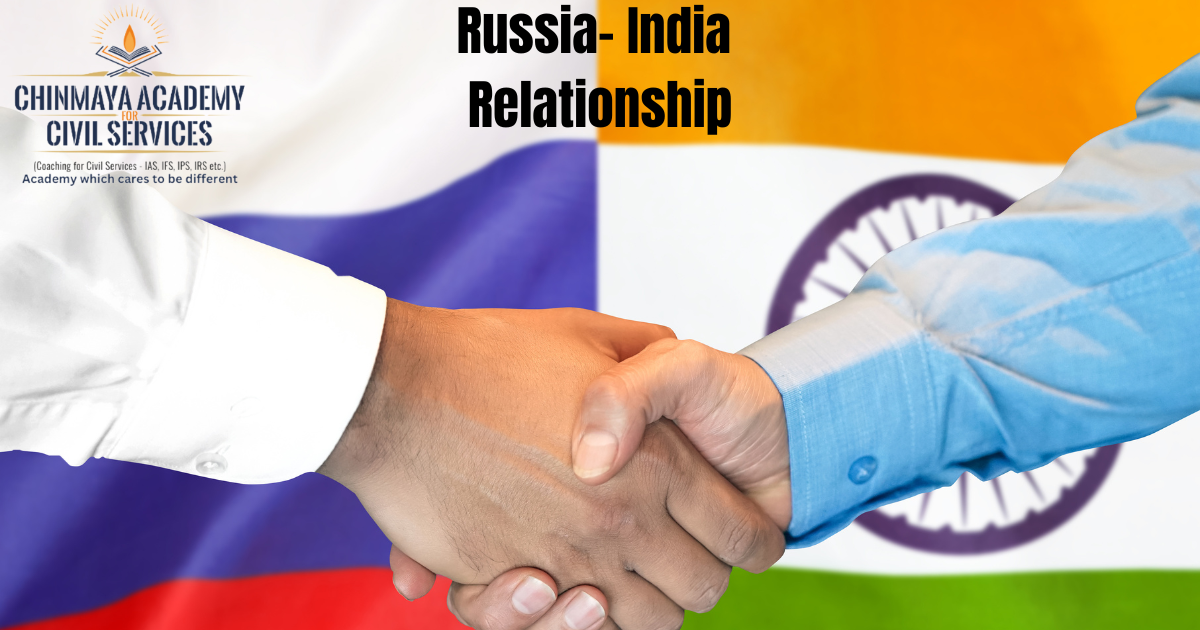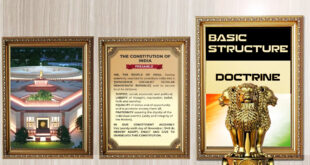India and Russia appear eager to reestablish their relations in the modern world.
The significant effort that Moscow and New Delhi have put forth to ensure that the meetings are fruitful and successful underscores the significance of External Affairs Minister S. Jaishankar’s visit to Russia this week. A five-day visit would seem unusually long to India at the end of a year of intense diplomacy, especially since the Kremlin leadership typically does not receive any high-level foreign visits during this time, which is immediately before its holiday season. Vladimir Putin, the president of Russia, rarely meets with foreign leaders of lower rank, as he did with Mr. Jaishankar.
India- Russia Relationship
The India-Russia relationship is a complex and multifaceted one, with deep historical roots and significant contemporary implications. Here’s a brief overview:
Cold War Era (1947-1991):
- Strong Strategic Partnership: India and the Soviet Union (USSR) developed a strong strategic partnership during the Cold War. They shared anti-colonial and anti-Western ideologies, and the USSR became a key supporter of India in its conflicts with Pakistan and China.
- Military Support: The USSR provided India with vast amounts of military equipment, training, and technological assistance,shaping India’s defense sector for decades.
- Economic Development: The USSR also aided India’s economic development through investments in heavy industries, dams, and other infrastructure projects.
- Ideological Alignment: Both India and the USSR saw themselves as leaders of the non-aligned movement, opposing both the U.S. and Western bloc and the Soviet bloc.
Post-Cold War Era (1991-Present):
- Continued Partnership: Following the dissolution of the USSR, Russia inherited the close relationship with India. The two countries signed a “Treaty of Friendship and Cooperation” in 1993, reaffirming their commitment to strategic partnership.
- Diversification of Relations: While retaining strong defense and nuclear collaborations, India also began diversifying its foreign policy, engaging more with the West and other Asian countries. This led to some strains in the Indo-Russian relationship.
- Contemporary Challenges: The growing closeness between Russia and China, India’s primary rival, and Russia’s invasion of Ukraine in 2022 have further complicated the relationship. India has adopted a neutral stance on the war, balancing its historical ties with Russia with its strategic interests and international pressure.
Contemporarily:
Key areas of cooperation: The India-Russia partnership encompasses various areas, including:
- Defence: Russia remains India’s largest supplier of military equipment, and the two countries collaborate on developing and producing advanced defence technologies.
- Nuclear energy: Russia has been a key partner in India’s civilian nuclear program, helping to build several nuclear reactors in the country.
- Space exploration: India and Russia have a long history of cooperation in space exploration, with joint missions and technology transfers.
- Trade and investment: Bilateral trade and investment between the two countries have been growing steadily, though still not at their full potential.
Russia’s Assistance to India: A Long and Multifaceted Legacy
Russia and India have enjoyed a long and complex relationship, marked by significant periods of cooperation and support. Throughout history, Russia, and before it the Soviet Union, has aided India in various ways, contributing to its development, defense, and global standing.
Military Cooperation:
- Arms Supplier: Russia has been India’s primary military equipment supplier since the Cold War era. This includes fighter jets like the Sukhoi Su-30MKI, tanks like the T-90S, and submarines like the Kilo-class.
- Technology Transfer: Beyond supplying equipment, Russia has also transferred critical military technology to India. This includes the co-production of missiles like the BrahMos and assistance in developing India’s indigenous nuclear submarine program.
Economic Assistance:
- Infrastructure Development: The Soviet Union and later Russia played a significant role in developing India’s infrastructure, particularly in heavy industries like steel and energy. This included the construction of dams, power plants, and other vital projects.
- Trade and Investment: Both countries have maintained a steady flow of trade and investment.
- Russia imports Indian pharmaceuticals, textiles, and agricultural products
- India imports Russian oil, fertilizers, and diamonds.
Political and Diplomatic Support:
- Cold War Ally: During the Cold War, the Soviet Union was a staunch ally of India, supporting its stance against colonialism and providing crucial diplomatic backing during conflicts with Pakistan and China.
- UN Security Council Seat: Russia has consistently supported India’s bid for a permanent seat on the United Nations Security Council.
Challenges and complexities:
Despite the strong ties, the India-Russia relationship faces some challenges:
- Russia’s relations with Pakistan: India’s long-standing rival, Pakistan, enjoys close ties with Russia, which can sometimes strain the India-Russia relationship.
- India’s closer ties with the West: In recent years, India has deepened its strategic partnership with the United States and other Western countries, which has been viewed with some suspicion by Russia.
- The Ukraine war: Russia’s invasion of Ukraine in 2022 has further complicated the India-Russia relationship, as India has refrained from condemning Russia’s actions while also maintaining its close ties with the West.
Overall, the India-Russia relationship remains an important one for both countries. While there are challenges, the deep historical ties and shared strategic interests continue to bind the two nations together.
Looking Ahead:
Despite these challenges, the India-Russia relationship remains significant on the global stage. Both countries share common interests in areas like counter-terrorism, regional security, and economic development. The future of their partnership will depend on their ability to navigate these complexities and find common ground while adapting to the evolving geopolitical landscape.
It’s important to note that the India-Russia relationship is multifaceted and constantly evolving. While the assistance Russia has provided India has been substantial, it’s crucial to acknowledge the complexities and ongoing challenges within the dynamic.
 Chinmaya IAS Academy – Current Affairs Chinmaya IAS Academy – Current Affairs
Chinmaya IAS Academy – Current Affairs Chinmaya IAS Academy – Current Affairs

